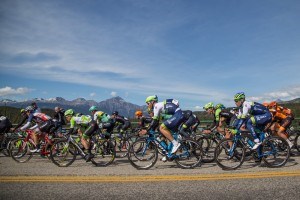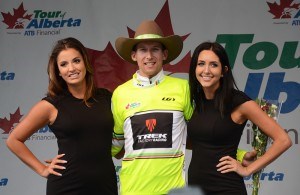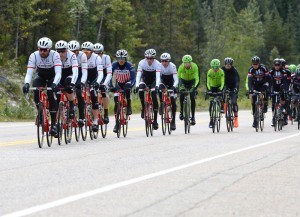
For a brief period over the weekend, Jasper National Park propelled itself onto the world stage, hosting the third and fourth stages of the Tour of Alberta.
It was the first time in the tour's three-year history that the snowy peaks of the Canadian Rockies took centre stage, with two mountaintop finishes in the park.
The first finish tested rider's endurance with a 18-km climb to the top of Miette Road after a gruelling 171.6-km journey from Grande Cache. Adding to the challenge were single digit temperatures and rain, forcing riders to bundle up for most of the race, before stripping down as the sun broke through for the final slog up the mountain.

“The last two kilometres were really, really hard, because of how steep it was at the end,” said Dutch cyclist Bauke Mollema, who managed to hold onto the yellow jersey despite finishing behind fellow countryman Tom-Jelte Slagter, who won Stage 3 of the race with a time of 4:28:18.
“I tried to close the gap in the last few hundred metres, but I couldn't close it.”
As the cyclists made their way to Miette Hot Springs, in town, the Visitor Information Centre lawn was transformed into a temporary cycling mecca, with dozens of vendors, a small stage and a Jumbotron to watch the event unfold live on television. Adding to the excitement was an onsite announcer, providing a play-by-play as the riders approached their final destination.
In addition to the cycling event, there were also plenty of other things to do and see, including an Aboriginal performance, hula hooping, slack lining and face painting for kids.
“It was just a great atmosphere,” said Duane Vienneau, CEO of the Tour of Alberta.
“Overall I think it was our best year. We had a bit of everything, we had snow, we had rain, we had wind, we had a great mountain stage and today in Edmonton we had a packed house, so it definitely wasn't boring this year,” he said after the final stage.
Sara Hamil, manager of brand and communications for Tourism Jasper, said the event went incredibly well.
“We had a really great turn out, the festivals went well, the weather cooperated on Saturday for our big day when the racers were racing from here in town up to Marmot Basin and overall it was just a really great event.”

On Saturday morning, hundreds of spectators stood shoulder to shoulder near the starting line on Connaught Drive to catch a glimpse of the athletes as they began Stage 4.
The 161.2-km route started with two laps through town, followed by a three-lap circuit down the Icefields Parkway and Highway 93A, before cyclists made the punishing 14-km climb to the finish line at Marmot Basin Ski Resort.
“It was incredibly hard on the last climb,” said Mollema, who finished four seconds behind Slagter, but held onto his overall race lead.
“It was one of the hardest kilometres in my life, but I managed to do it.”
Known for his sprinting skills, Slagter waited patiently before making his final attack with less than 500 metres to the finish line. The strategy paid off and he crossed the line with a time of 4:09:26.
“I just had to wait and wait and just tried to hang on for as long as possible,” said Slagter, during a press conference immediately after winning Stage 4.
Along the way, spectators lined the route to cheer on the cyclists, including a family who watched the action from a canoe on Leech Lake, near Highway 93A.
“It was one of the best days in the history of the tour,” said Vienneau about the ride up to Marmot. “The scenery was great and the racing itself was tremendous.”
Slagter may have won both mountain stages, but it was his fellow countryman Mollema who was crowned the overall winner of the race following Stage 6 in Edmonton, Sept. 7.
Ottawa’s Michael Woods was the top Canadian overall, placing 10th in the general classification, while Benjamin Perry of St. Catharines, Ont., held onto the polka-dotted King of the Mountain jersey for earning the most points during the climbs.
“We will for sure be coming back,” said Vienneau. “Now that we've gone to the mountains it's going to be hard not to have a mountain stage in the Tour of Alberta.”
Paul Clarke
[email protected]
